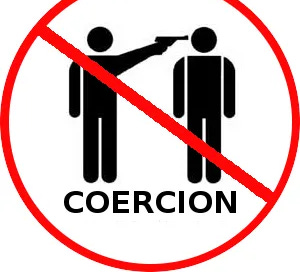Libertarians want to move in the direction of a free market society. But of course, not everyone is on board with this ideal. Some people think a free market would be unjust, or inefficient. In this post, however, I want to explore a different objection. The problem with trying to establish a free market society, according to the argument I want to consider, is that there’s simply no such thing.
The argument takes two different forms. Each version contains an important grain of truth, which libertarians ought to take seriously. But neither argument gets critics to where they want to go. Neither gives us reason to reject the libertarian ideal of a free market. Or so I’ll argue. I’ll deal with the first version in this post, and the second in a later one.
The first version of the argument centers on the idea of coercion. “There’s no such thing as a free market,” the argument goes, “because all markets involve coercion, just like regulated markets or socialist economies do.”
You can find this argument in Tyranny Inc., the recent book by the socialists’ favorite conservate, Sohrab Ahmari. Ahmari draws on a famous article by Robert Hale, the thesis of which is that “the systems advocated by professed upholders of laissez-faire are in reality permeated with coercive restrictions of individual freedom.” Private property rights are backed up by the threat of physical force. The factory owner can boss his worker around, and his orders are backed up by the coercive power of the state. A propertyless worker who tries to eat food that does not belong to him, or sleep in a bed that is not his, will find himself on the wrong end of an officer’s billy club.
All of this is true, as far as it goes. Indeed, I’ve made basically the same argument myself in the past. The core of a property right is the right to exclude. And the right to exclude means that other people’s ability to do what they want with your property is limited. The more a person’s actions are limited by other people’s fences, the fewer options they have. It doesn’t seem to me to be too much of a stretch to call that a limitation on their freedom.
But what should we conclude from this? All legal property arrangements involve coercion. So is there no difference then between the coerciveness of a laissez-faire economy and a more heavily regulated one? Is an economy based on free labor just as coercive as a Stalinist, centrally planned one?
That seems silly. Even if all systems of ownership involve coercion, surely there are important differences between the degree and kind of coercion involved. We can start by noting, with Friedrich Hayek, that coercion based on general rules is very different from coercion based on the imposition of someone’s arbitrary will. People can learn the rules of property in advance, and plan their lives around them. A Stalinist dictator, in contrast, is much harder to predict - or avoid.
Coercion can also limit options that are more or less central to a person’s interests. It’s one thing for me to tell you that you’re not allowed to walk on my lawn. It’s another thing for me to tell you that you can’t practice your preferred religion. It’s yet another thing if everyone is telling you that you’re not allowed to walk on their lawn, or in their store, and doing so deprives you of access to essentially needed resources.
So where does this leave us? The argument scores a point, I think, against a simplistic version of libertarianism - one which holds that libertarianism stands for freedom and against coercion, full stop. That’s nice rhetoric. But it’s bad philosophy. Libertarianism is for certain kinds of freedom, and opposed to others. It is against certain kinds of coercion, and in favor of others.
There are no solutions; there are only trade-offs. Libertarians believe that the kind of freedom protected by property rights are important, both intrinsically and for their instrumental benefits. And they believe the coercion necessary to uphold those property rights is worth it, morally speaking.
This way of thinking about coercion makes certain issues less black and white than libertarians tend to want them to be. For instance, it opens up the door for Spencerian worries about the possible coercion involved in the private ownership of land. On a more practical level, it complicates issues about public accommodations doctrine, or anti-discrimination law, or even (as I’ve argued elsewhere) the Universal Basic Income.
Once you grant that a free market society doesn't eliminate coercion but simply tries to minimize it, then the door is open to ask whether some regulatory tweaks to the system here or there might not do a better job of striking the right balance. Maybe the least coercive system is a market economy with an income floor, or with legal protections for disfavored minorities, or…
Figuring out which exceptions to the general principle of laissez-faire are justified is difficult. But that’s as it should be. The questions are hard because the problem is hard. Ignoring the difficulty of the problem by making oneself blind to it with an overly simplistic philosophy doesn’t make the problem go away.





I don’t know what your second point is but I have never liked your first one.
The coercion or force is applied to both parties. The little guy is far more in need of the coercion to protect what he has than a rich guy who can hire an army. Once they both accept their need to protect what is theirs, the violence is then not about the property but about the violation of the agreement.
We can be sad about the consequences of the agreement ie poverty but criticizing property rights, which has brought more people out of poverty, sounds wrong.
I own myself. I sure hope the government punishes someone who hurts me.